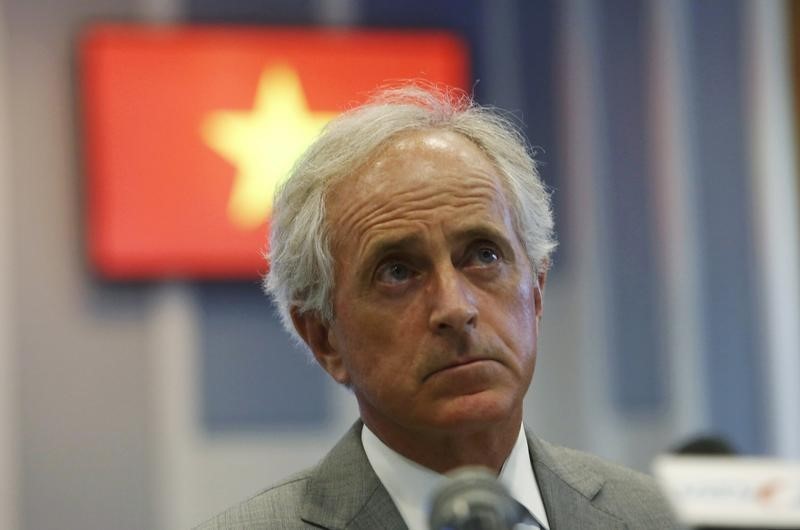By Patricia Zengerle
WASHINGTON (Reuters) - Republican and Democratic U.S. lawmakers will press ahead with a plan for more sanctions on Iran, the chairman of the Senate Foreign Relations Committee said on Wednesday, despite White House warnings that they risked derailing nuclear talks.
Lawmakers, who say they fear Obama administration negotiators may not take a hard enough line with Tehran, are also at work on a separate bill to have Congress approve any final agreement on Iran's nuclear programme, Senator Bob Corker, the chairman, told Reuters in an interview.
"There's continual efforts to try to figure out a way for Congress to play a role to strengthen whatever final deal may occur," the Tennessee Republican senator said.
Republican Senator Mark Kirk and Democratic Senator Robert Menendez are finalising a bill for tougher sanctions on Iran if there is no final nuclear deal by June 30.
The Senate Banking Committee is due to hold a hearing on Iran sanctions on Tuesday, said Corker, a member also of that panel.
Kirk and Menendez introduced a sanctions bill in December 2013, but it did not come up for a vote in the Senate, then controlled by President Barack Obama's fellow Democrats, who lost control of the chamber because of big losses in November elections.
The White House has insisted passage of a sanctions bill now - even one that would impose new restrictions only if there is no deal by the deadline - could prompt Iran to back out of the nuclear talks with six world powers.
Although Republicans now hold a 54-46 seat majority in the Senate, Corker said he did not know if there would be enough votes - 67 - needed in the Senate to override an Obama veto of any Iran legislation.
ISLAMIC STATE CAMPAIGN
Corker also said Republicans were open to giving Obama discretion in how to conduct the campaign against Islamic State militants, if he were to seek a formal authorization for the use of military force against them.
But they want the White House to provide them with a plan and the administration is still in the very early stages of laying the groundwork with Congress for any legislation.
Obama launched an air campaign against Islamic State fighters in Iraq and Syria in August and is deploying up to 3,000 military personnel in Iraq to train and support local forces. He adopted a go-slow approach to the issue of formal authorization for the campaign last year.
"It's very possible that over the next couple weeks we actually are able to have some language from them (the Obama administration), which is an important first step in the process," Corker said.
The Obama administration may be closer to congressional Republicans than Democrats on the issue of the military campaign. Many Democrats want any authorization to bar sending in U.S. combat troops - "boots on the ground" - but Republicans generally agree that it is better not to restrict military commanders.
"Republicans lean towards authorizing the president to deal with ISIS in an appropriate way. And generally speaking, Democrats want to see limitations on that," Corker said.
HEARINGS ON CUBA
Corker promised "robust" committee hearings in coming weeks on the administration's December announcement it would seek to normalize U.S. relations with Cuba.
"All of us are going to know a lot about the Cuba situation probably by the end of February," he added.
The news of Obama's Cuba policy shift infuriated hardline members of Congress - led by Cuban-American Republicans - who vehemently oppose easing restrictions on trade or improving relations with the island nation's Communist government.

Corker said he had yet to take a position on the issue, although he said he did not think the 53-year-long Cuban embargo had been effective.